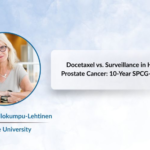
At the 51st Annual Meeting of EBMT, Dr. Eduardo Rodríguez-Arbolí presented important long-term data from an ALWP-EBMT study focusing on patients with acute myeloid leukemia (AML) who underwent haploidentical HSCT using post-transplant cyclophosphamide (PT-Cy).
The findings showed that long-term outcomes in patients transplanted in CR1 were favorable, with low but present risks of relapse, non-relapse mortality (NRM), and chronic GvHD. Interestingly, outcomes did not significantly differ between haploidentical donors, matched sibling donors, or 10/10 matched unrelated donors. The analysis also found no unique pattern in late complications specific to haploidentical transplants compared to historical data.
The study suggests that selecting younger and male donors for male recipients might help reduce late NRM risks. Although relapse remains the primary cause of late mortality, integrating molecular profiling and MRD status could enhance future risk prediction models.
This impressive study was led by Dr. Rodríguez-Arbolí alongside an international team of experts, including Dr. Alain Thibeault, Dr. Ferhat Berland, Dr. Emanuele Angelucci, Dr. Montserrat Rovira, Dr. Fabio Ciceri, and many others from across Europe and beyond.
A sincere thank you to all contributors and institutions involved for advancing our understanding of long-term transplant outcomes in AML.


